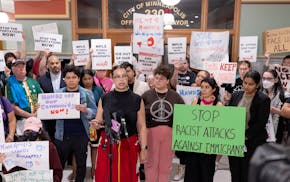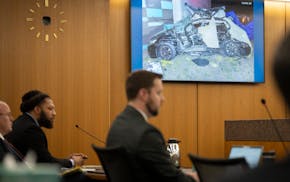A University of Minnesota statistician said Tuesday that there's an extremely low probability that Republican Aaron Paul would have won a consequential Shakopee-area House race had 20 missing absentee ballots been counted.
Aaron Rendahl, an associate professor of statistics and informatics at the U's College of Veterinary Medicine, testified as much on the final day of a hearing on Paul's election contest of DFL Rep. Brad Tabke's victory in the race to represent House district 54A.
Paul and House Republicans filed a lawsuit Nov. 29 contesting the results and saying that elections officials engaged in "deliberate, serious and material violations" of state election law when they lost 21 ballots yet declared Tabke, the incumbent, the winner by 14 votes.
Paul is asking the court to declare a vacancy for Tabke's seat once his current term ends, giving voters the chance to decide a winner "pursuant to Minnesota law governing special elections." David Zoll, Tabke's attorney, argued Monday at the Scott County Judicial Center that calling a special election would disenfranchise the roughly 22,000 voters who cast ballots Nov. 5.
Rendahl said Paul couldn't have earned enough votes to close the 14-vote gap between him and Tabke, if Tabke had picked up four of those 20 uncounted absentee ballots. Earlier in the day, six voters testified that they cast ballots for the DFL representative that were among those not counted.
At the heart of Paul's contest are 20 absentee ballots that were likely thrown away in their secrecy envelopes before being tabulated. Scott County officials launched an investigation into the situation after discovering a discrepancy between the number of absentee ballots received and counted.
Tabke said in an interview after the Dec. 17 hearing that Rendahl's expert testimony, coupled with the statements of six DFL voters, showed there is "mathematically no doubt" that he won the election.
"We look forward to serving in the Minnesota House as we move forward," he said.
DFLers and Republicans will share power for the first time since 1979 if Tabke's victory stands. If Paul were to win, Republicans would have a one-vote majority.
Questions of probability
Rendahl said he based his calculations on a random sample of votes from Shakopee's 10th Precinct, where 20 of the missing ballots were cast. (Officials opted not to investigate a single missing ballot cast in another precinct after noting it's not uncommon for one voter to check in and not vote.)
Tabke won the city's 10th precinct by roughly 200 votes, according to results posted on the Secretary of State website.
Reid LeBeau, Paul's attorney, argued the statistician's findings are flawed because the random sampling didn't account for the demographics of early voters — the group that cast the 20 uncounted absentee ballots.
"You have no basis for knowing whether the missing votes were random," LeBeau said.
To counter Rendahl's claims, LeBeau called his own witness, a political science professor at the University of Texas at Dallas.
Thomas Brunell disputed the methodology that led Rendahl to the finding that Paul had a slim chance of winning. The statistician's failure to factor the voting patterns of early voters into his analysis is a problem, Brunell said.
"The court shouldn't accept Dr. Rendahl's conclusion," Brunell said. "All 20 of these votes could be Republican. All 20 could be Democratic. We don't know, and just sort of imputing missing votes strikes me as kind of inconsistent with free and fair elections."
Zoll, Tabke's attorney, attempted to paint Brunell as a partisan witness who lacks the credentials to weigh-in on complex questions of probability.
Zoll noted, and Brunell confirmed, that the political science professor didn't analyze the returns of early and Election Day voters in Shakopee's 10th Precinct. As a result, Zoll questioned how Brunell could know if there are demographic differences between these voters — and whether factoring that information into Rendahl's analysis would have altered his findings.
Brunell told the court he's earning $500 an hour for his expert testimony. The political science professor said he has previously served as an expert witness on redistricting matters, primarily for Republicans.
LeBeau told reporters after the hearing that Judge Tracy Perzel said she intends to issue a ruling soon.
An appeal of the District Court's decision would go directly to the Minnesota Supreme Court. Court decisions would then be forwarded to the Minnesota House for a legislative hearing, according to state statute.

Minneapolis City Council lowers street food cart license fee, hoping fruit sellers will hawk legally

How the federal raid unified the fractious Minneapolis City Council against Trump, sort of
Trump travel ban 'cruel,' Minnesota advocacy group says

No verdict after first day of jury deliberation in Derrick Thompson murder trial for crash that killed 5

